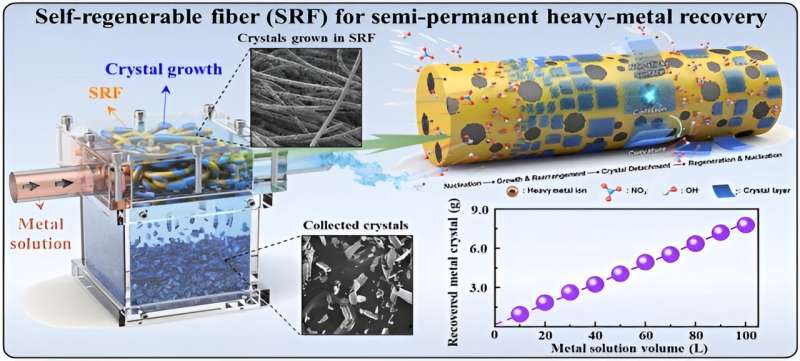This article has been reviewed according to Science X's editorial process and policies. Editors have highlighted the following attributes while ensuring the content's credibility:
fact-checked
trusted source
proofread
Eco-friendly, self-regenerative fiber material recovers valuable metals from industrial wastewater

Technology to recover valuable metals from wastewater generated in various industries such as plating, semiconductors, automobiles, batteries, and renewable energy is important not only for environmental protection but also for economic reasons.
In Korea, chemicals are mainly added to wastewater to precipitate heavy metal ions in the form of oxides, but accidents such as leakage of hazardous chemicals have occurred one after another, so it is necessary to develop more eco-friendly technologies.
Against this backdrop, the Korea Institute of Science and Technology (KIST) announced that Dr. Jae-Woo Choi's team at the Water Resource Cycle Research Center has developed a fiber-like metal recovery material that can recover metal ions in water by adsorbing and crystallizing the metal, and the recovered metal crystals can desorb and regenerate themselves.
The study is published in Advanced Fiber Materials.
The KIST research team has developed a semi-permanent adsorption material by utilizing the phenomenon that metal ions in water crystallize when certain chemical functional groups are fixed on the surface of a fiber-like material and introducing a technology to remove the formed crystals. When tested with copper ions, the maximum adsorption amount of existing adsorbents is only about 1,060 mg/g, but by utilizing the developed material, near-infinite adsorption performance can be secured.
In addition, existing high-performance adsorbents are in the form of small granules with diameters ranging from a few nanometers to tens of micrometers, making it difficult to utilize them underwater, but the metal recovery material developed by the KIST research team is in the form of fibers, making it easy to control underwater, making it easy to apply to actual metal recovery processes.
"Since the developed material is based on acrylic fibers, it is not only possible to mass produce it through a wet spinning process, but also to utilize waste clothing," said Dr. Jae-woo Choi of KIST. "The wastewater recycling technology will help reduce the industry's dependence on overseas sources of valuable metals that are in high demand."
More information: Youngkyun Jung et al, A Self-Regenerable Fiber Sloughing Its Heavy Metal Skin for Ultrahigh Separation Capability, Advanced Fiber Materials (2023). DOI: 10.1007/s42765-023-00333-0

















